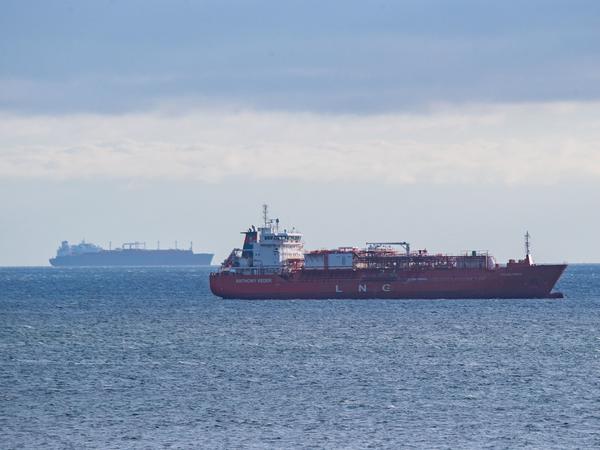Robert Habeck’s Federal Ministry of Economics is planning to have more LNG terminals for gas imports than are currently required. The Greens politician admitted this at a campaign event in Bremen on Tuesday evening. “Yes, we are planning with overcapacity, we are doing that,” said Habeck in response to a question from the audience, adding: “And I think that’s right.”
The Vice Chancellor pointed out that since the gas supply stop from Russia via the Nord Stream I pipeline, Germany has been purchasing 55 billion cubic meters less gas. The three floating LNG terminals in Wilhelmshaven, Brunsbüttel and Lubmin have so far only built up an import infrastructure for twelve billion cubic meters of gas. In addition, eight billion cubic meters were added in the Netherlands. “There are still 35 missing,” said Habeck in Bremen.
Habeck: Prepare for eventualities
The gap was compensated because industry shut down production and citizens saved gas in winter. “But there is no guarantee that this will always be the case,” Habeck continued. One must prepare for all eventualities, the Vice Chancellor warned, referring to the attack on the Nord Stream II pipes last year. “There was also a fire in a large LNG terminal, in this case in Texas,” Habeck recalled. The fire that followed an explosion left one of the world’s largest liquefied natural gas terminals out of action for weeks. The FBI was investigating at the time.
Habeck emphasized that it is his duty as Economics Minister to guarantee Germany’s energy security: “One of my lessons from the past year is not to assume that everything will always go well,” he said. It therefore makes sense to build a certain reserve. “Even for the price that we might not need them.” Although the gas storage facilities are currently around 67 percent full, the federal government therefore wants to build more gas infrastructure.
Habeck and Chancellor Olaf Scholz (SPD) have announced several times that they want to put more LNG terminals into operation. Another floating terminal is to be built in Stade by the end of 2023, and a second regasification ship (so-called FSRU) is to be moored in Lubmin and Wilhelmshaven. However, the plans for an LNG terminal off the holiday island of Rügen are particularly controversial. Here the federal government wants to use the port of Mukran.
Habeck: “I see the danger of a gas login”
In contrast, protests have formed on the island in recent months. More than 50,000 signatures have so far been collected against the construction project. A meeting between Scholz and Habeck with local politicians in Rügen a few days ago was unable to resolve the conflict. “The report that the federal government has already bought the pipes for the construction of the terminal shows the bias,” said the mayor of Binz, Karsten Schneider, after the conversation with Scholz and Habeck of the daily mirror. He could understand that the people on the island would lose “the belief in democracy”.

Environmental organizations are also mobilizing against the LNG plans in front of Rügen. They have concerns about nature conservation and fear damage to the ecosystem. The harbor porpoise would be threatened and migratory birds disturbed. In addition, the environmental organizations were convinced that Germany could miss its climate targets by building LNG terminals. The concern: The investments would only pay off financially if the terminals were operated long enough – but that contradicts the climate neutrality that the federal government wants to achieve by 2045.
“I see the danger of a gas login,” assured Habeck in Bremen. However, this can be prevented by making regulations that the LNG terminals are converted to hydrogen as soon as possible. Habeck promised to react if there were permanent overcapacities: “If we notice that Germany is saving more gas, if more heat pumps are installed, if gas consumption goes down – then we’ll just send the ships somewhere else.” One is flexible, the infrastructure ” without major cost losses”.
Habeck also commented on the protests of the last generation during the campaign appearance a week and a half before the state elections in Bremen, where the Greens are currently co-governing in an alliance with the SPD and the left. “I have a lot of respect for these people and I believe the seriousness of their concerns,” said the Green politician about the climate protection activists who had repeatedly blocked traffic in Berlin in the past few days. “Politically, I think it’s wrong, like them Campaigns are underway,” added Habeck.
In a democracy it is about creating majorities. “That is clearly not the case,” Habeck said of the last generation. On the other hand, he praised the Fridays for Future protests, which triggered a “majority movement” across Germany. “Basically, they made climate protection capable of winning a majority.” The actions of the last generations, on the other hand, are unhelpful and wrong.
